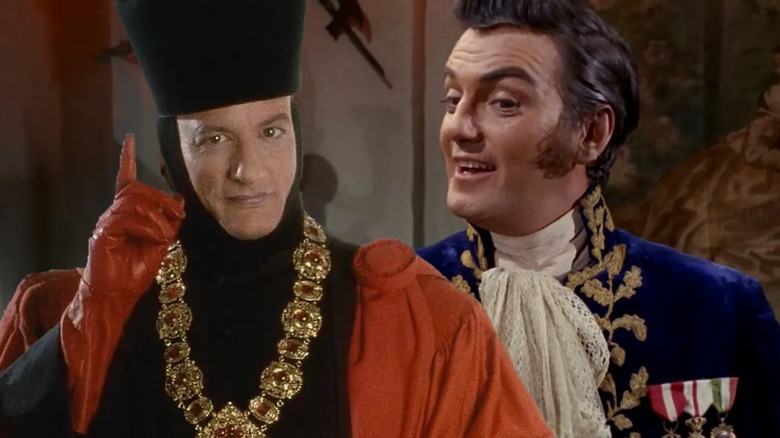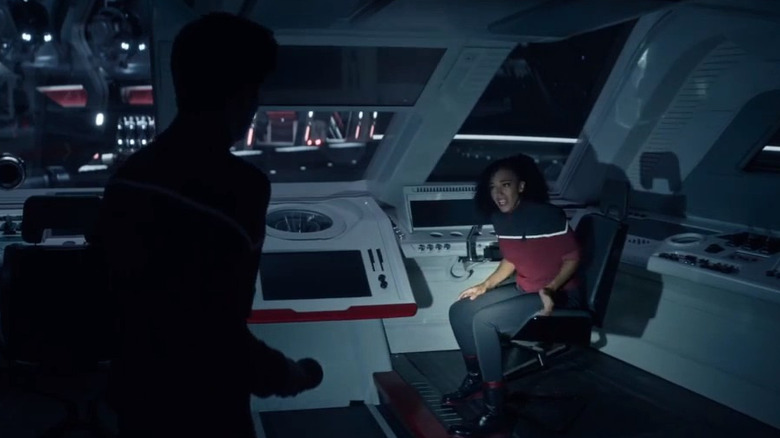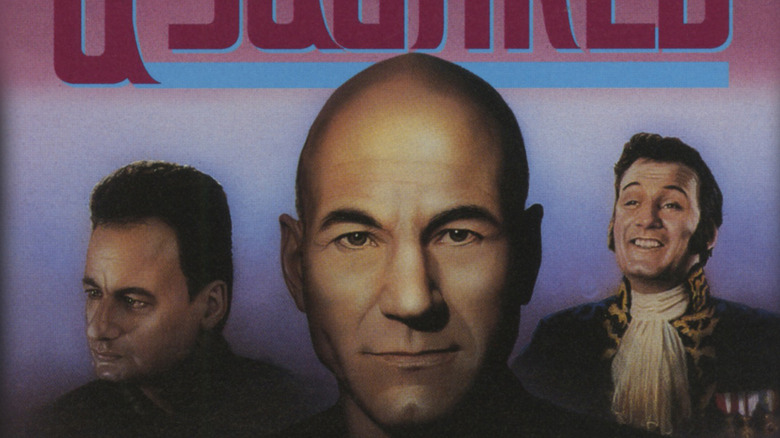The Best Throwaway Joke In The Strange New Worlds/Lower Decks Crossover Makes A Big Fan Theory Canon
This post contains spoilers for the latest episode of "Star Trek: Strange New Worlds."
One of the more amusing aspects of "Star Trek" is that when a Starfleet captain meets an all-powerful deity, in some cases literal gods, they roll their eyes. "Star Trek" takes place in a post-religious world wherein old faiths have given way to a form of technology-driven benevolent humanism. When Captain Kirk (William Shatner) meets Apollo, the god is waved away as a problem that needs to be solved. When Kirk meets the Mesoamerican deity Kukulkan, he merely explains to the all-powerful serpent that humanity how outgrown the need for gods. When Kirk meets an impish trickster god named Trelane, the Squire of Gothos (William Campbell), he slaps him across the face.
The same is true of Captain Picard (Patrick Stewart). When Picard meets an equally impish trickster god named Q (John De Lancie), he rolls his eyes and declares that humanity is doing just fine without divine intervention. Q may be omnipotent, but he is seen more as a nuisance than a threat.
"The Squire of Gothos" (January 12, 1967), one of the better episodes of the original "Star Trek" series, depicted the title character as a dandyish aristocrat who was obsessed with Earth's war history. He giggled like a little boy and insisted others listen to his harpsichord. He also seemingly had unlimited power and could bend reality to his will. Q, meanwhile, was first seen in "Encounter at Farpoint," (September 28, 1987) the NextGen pilot. Savvy Trekkies immediately saw the similarities between the two characters, and a retrospective fan theory just as quickly formed — was Trelane a member of the Q species?
Thanks to a tossed-off line of dialogue in "Those Old Scientists," the latest episode of "Star Trek: Strange New Worlds," that might finally be canonically confirmed.
Don't yell Q
In "Those Old Scientists," Ensign Boimler (Jack Quaid) and Ensign Mariner (Tawney Newsome) have been thrown back in time 120 years, and have immediately become careful about tainting the timeline. Boimler, to undo some damage he incurred, sneaks aboard a shuttlecraft where he is startled by Ensign Mariner (Tawney Newsome). He exclaims "Holy Q!" and Mariner immediately shushes him. In her usual flip fashion, she then explains that the people in this timeline haven't met Q yet. "They sort of had a Trelane thing going on."
Trekkies enacted the "Once Upon a Time... In Hollywood" meme. If Trelane isn't a Q, the characters within "Star Trek" at least acknowledge the similarities. Surely they have made the same connection theories as fans.
Trekkies, with their instincts toward canonical nitpicking, have long held that Trelane was a Q. At the end of "The Squire of Gothos," Trelane's "parents" appeared to scold him for playing too rough with his human "pets." Trelane whines like a child and vanishes into the ether. His parents — depicted as glimmers of light — apologize to Captain Kirk for their child's behavior. Were they Qs?
In "Encounter at Farpoint," Q explains that he is a member of the Q Continuum, a panoply of ineffable space deities that have existed for an untold amount of time. They can do anything and know everything. Q is also fixated on the darker chapters of Earth's history, pointing out to Picard that humans have a distressing tendency toward war and death. Both Q and Trelane know a lot about tactics and battles and war. Trelane sees such activities as fun hobbies while Q uses them to condemn humanity. Q puts humanity on trial for its crimes, using Picard as the primary defendant.
Q-Squared
Of course, the Q-Trelane connection had already entered the conversation in Peter David's 1994 expanded-universe "Star Trek" novel "Q-Squared." Addressing the fan theory that Trelane was a young Q, David wrote a story wherein Trelane was brought on board the Enterprise-D by an impatient Q, tasked with babysitting him. It seems that Trelane, while still a child in the eyes of the Q Continuum, has somehow become even more powerful than all-powerful. Indeed, Trelane seems to be overseeing three disparate timelines, all laid out in the novel. Trelane dies at the end, but then, he's immortal. His "death" was really just his life being shunted backward in time. Because he tried to oversee three realities at once — three lanes — he was given the nickname tre-lanes, or Trelane.
"Q-Squared" was quite an event for the Trekkies who keep track of expanded universe lore, as it was considered the first sanctioned confirmation that Trelane and Q were of the same species. It should be explained, however, that while "Star Trek" novels are authorized by Paramount, they are not canonical.
The authors may have to play within certain parameters — they cannot, for instance, kill off characters or end their novels well outside of the status quo– but their books are still not considered "official" parts of the "Star Trek" timeline. The novels are more or less a playground wherein writers and fans can postulate their theories in a more palpable way. Have you ever wanted to see what happened when Q met Lwaxana Troi? Read Peter David's "Q-in-Law."
It's rare that a novel influences Trek canon, but perhaps the long-held fan theory was solidified by Peter David. Thanks to "Strange New Worlds," it's official official.


